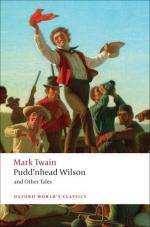I did not give the banquet. I had not written the ‘mark Twain’ distinctly; it was a fresh name to Eastern printers, and they put it ‘Mike Swain’ or ‘MacSwain,’ I do not remember which. At any rate, I was not celebrated and I did not give the banquet. I was a Literary Person, but that was all—a buried one; buried alive.
My article was about the burning of the clipper-ship ‘Hornet’ on the line, May 3, 1866. There were thirty-one men on board at the time, and I was in Honolulu when the fifteen lean and ghostly survivors arrived there after a voyage of forty-three days in an open boat, through the blazing tropics, on ten days’ rations of food. A very remarkable trip; but it was conducted by a captain who was a remarkable man, otherwise there would have been no survivors. He was a New Englander of the best sea-going stock of the old capable times—Captain Josiah Mitchell.
I was in the islands to write letters for the weekly edition of the Sacramento ‘Union,’ a rich and influential daily journal which hadn’t any use for them, but could afford to spend twenty dollars a week for nothing. The proprietors were lovable and well-beloved men: long ago dead, no doubt, but in me there is at least one person who still holds them in grateful remembrance; for I dearly wanted to see the islands, and they listened to me and gave me the opportunity when there was but slender likelihood that it could profit them in any way.
I had been in the islands several months when the survivors arrived. I was laid up in my room at the time, and unable to walk. Here was a great occasion to serve my journal, and I not able to take advantage of it. Necessarily I was in deep trouble. But by good luck his Excellency Anson Burlingame was there at the time, on his way to take up his post in China, where he did such good work for the United States. He came and put me on a stretcher and had me carried to the hospital where the shipwrecked men were, and I never needed to ask a question. He attended to all of that himself, and I had nothing to do but make the notes. It was like him to take that trouble. He was a great man and a great American, and it was in his fine nature to come down from his high office and do a friendly turn whenever he could.
We got through with this work at six in the evening. I took no dinner, for there was no time to spare if I would beat the other correspondents. I spent four hours arranging the notes in their proper order, then wrote all night and beyond it; with this result: that I had a very long and detailed account of the ‘Hornet’ episode ready at nine in the morning, while the other correspondents of the San Francisco journals had nothing but a brief outline report—for they didn’t sit up. The now-and-then schooner was to sail for San Francisco about nine; when I reached the dock she was free forward and was just casting off her stern-line. My fat envelope was thrown by a strong hand, and fell on board all right, and my victory was a safe thing. All in due time the ship reached San Francisco, but it was my complete report which made the stir and was telegraphed to the New York papers, by Mr. Cash; he was in charge of the Pacific bureau of the ‘New York Herald’ at the time.




